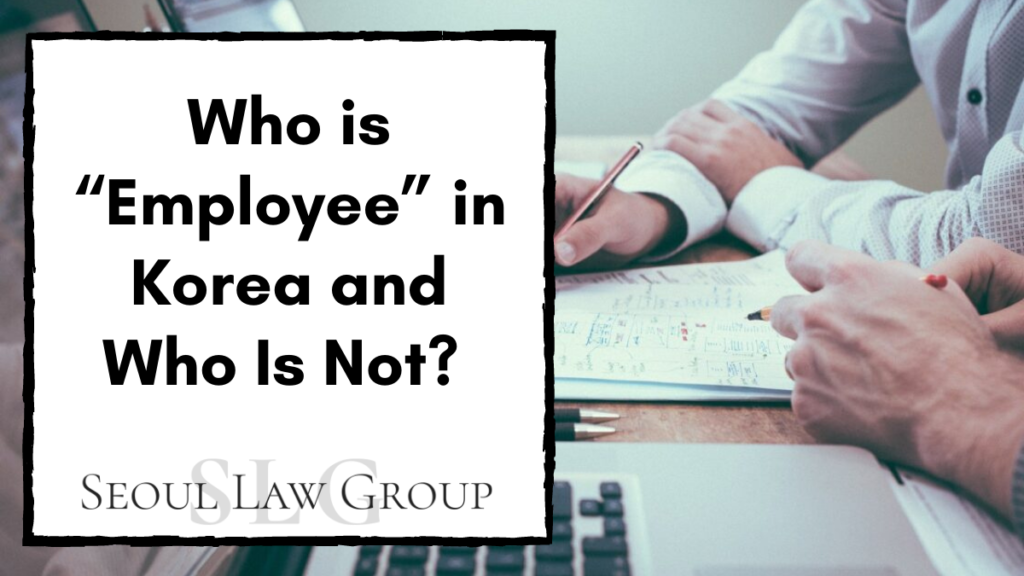Who is “Employee” in Korea and Who Is Not?
The law that regulates workers’ rights in Korea is called Labor Standards Act. The problem is, you must be an “employee” to enjoy such rights. This is why we need to make sure what is the definition of “employee” is.

Article 2 (Definitions)
(1) The terms used in this Act are defined as follows:
-
-
- The term “employee” means a person, regardless of the kind of occupation, who offers labor to business or a workplace for the purpose of earning wages
-
Table of Contents
Employees in Korea
Regardless of the type of job, a person who offers labor for the purpose of earning wages is considered an “employee.” For instance, a trainee or medical resident, who works and be trained at the same time, can be an “employee.” Executives such as company directors can also be “employees” if they are actually paid in return for doing a certain work under the direction and supervision of someone higher.
1. What Defines an Employee
When there is a dispute over whether someone is an employee or not, the Korean court judges according to the following criteria.
- Whether the details of their work are determined by the employer
- Whether they are subject to workshop rules or personnel regulations
- Whether they receive specific and individual commands and supervision from the employer while working
- Whether their working hours and place of work are assigned by the employer
- Whether there is a substitution of work, such as the employees themselves hiring another person to work instead of them
- Ownership of supplies, raw materials, and work tools
- Matters concerning wages, such as whether the wage is paid in return of the work itself, whether the basic pay and fixed salary were determined, and whether the earned income taxes were withheld from paychecks, etc.
- Continuity of labor relations and the existence and degree of exclusivity to the employer
- Whether their status as an employee is recognized by other laws, such as Framework Act on Social Security.
Please note that Number 7 and 9 are not considered too important. The court says that the status as an employee should not be easily denied just because “the basic pay and fixed salary were not determined” or “the earned income taxes were not withheld from paychecks,” because there is a lot of room for employers to make arbitrary decisions for such things, by using their superior positions.
2. Who Is Recognised as an Employee
These are actual cases which have been recognized as “employee” by the Korean Court.
- Newspaper salesman
- Broadcast subscription fee collector
- The exclusive driver of the swimming pool
- Motorcycle dispatch rider, who owns their own motorcycle
- Medical resident
- Orchestra member working in a broadcasting company
- Science experiment assistant in elementary school
- Part-time lecturer at the foreign language institution
- Part-time lecturer in the university
- Massager
- Telemarketer
- Wedding planner
3. Who Is Not Recognised as an Employee
These are actual cases which have been NOT recognized as “employee” by the Korean Court.
- Insurance salesman
- Electricity bill collector
- Home-study teacher
- Concrete mixer truck driver, who owns their own mixer truck
- Kindergarten bus driver
- Bar singer
- Golf caddie
- Animation coloring artist
- Personal trainer at the gym

You made some respectable points there. I regarded on the internet for the issue and found most individuals will associate with along with your website.
Thank you for your kind words. If you require any assistance with your legal matters, please do not hesitate to reach out to us via email at info@seoullawgroup.com. We are here to assist you.
Hi my loved one! I want to say that this post is awesome, nice written and come with approximately all important infos. I would like to see more posts like this .
We appreciate your gracious words, and we remain committed to continuous improvement. If you ever have any legal inquiries in the future, please do not hesitate to contact us at info@seoullawgroup.com. We are here to assist you with any questions or concerns you may have. Thanks you for your support.
I have been surfing online more than three hours today, yet I never found any interesting article like yours. It is pretty worth enough for me. Personally, if all website owners and bloggers made good content as you did, the net will be much more useful than ever before.
Hi there! This post couldn’t be written any better! Reading through this post reminds me of my previous room mate! He always kept talking about this. I will forward this article to him. Pretty sure he will have a good read. Thank you for sharing!
Thank you for your kind words. If you require any assistance with your legal matters, please do not hesitate to reach out to us via email at info@seoullawgroup.com. We are here to assist you.
Thank you for your kind words! We’re glad to hear that you found our content interesting and valuable. Our goal is to provide useful information and insights to our readers. If you have any specific questions or topics you’d like to see covered in the future, please feel free to let us know. We appreciate your feedback!